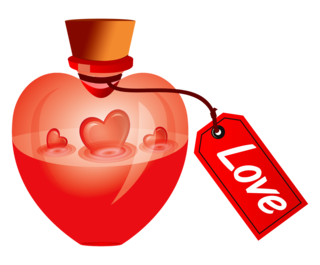
I mentioned in a recent post that I like opera. That entry was a comment on jealousy, which features quite often in operatic dramas. There are a number of other psychological themes found in opera, amongst them the curious idea that one person could make another fall in love with them by giving them a love potion. There is a love potion in Wagner’s Tristan and Isolde, and in Donizetti’s L'elisir d'amore (The Elixir of Love), as the title itself suggests. Predictably, love elixirs create all sorts of awful difficulties for the characters in these stories.
Oxytocin, a hormone produced in the hypothalamus, has been sometimes labelled as a love chemical. Oxytocin is a curious chemical messenger. It has myriad functions, from the boringly physiological to the excitingly romantic. It was named after its obstetric properties (it facilitates the delivery of the baby), but it also has an interesting psychological role as the catalyst of social and romantic bonding. It is, in other words, similar to the magic potion that makes us fall in love. It has also been suggested that it may have a role in perpetuating a bond because individuals who enjoy good relationships have apparently higher levels of oxytocin in their bloodstream. By strengthening social bonding, oxytocin may also be implicated, allegedly, in promoting feelings of xenophobia against those outside that social bond, which isn’t so romantic.
Incidentally, the time when we feel closest to happiness is when we fall in love, as long as it is reciprocated, of course. When it isn’t, we may experience “broken heart syndrome”, or Takotsubo’s cardiomyopathy, as it is known in medicine, which affects the muscle of the heart and can be life-threatening. So, it is true, unrequited love can actually break your heart, or so it seems.
No one has postulated, to my knowledge, the use of oxytocin as an actual love potion, like those used in operas and old romantic tales. Obviously, this wouldn’t be a medical indication and it would have some very dodgy ethical connotations. Love is, in any case, a very complex bag of emotions that become deeply rooted in our brain. It will never be the result of a single chemical acting on our central nervous system. And anyway, as everybody knows and love songs constantly remind us, romantic love is the source of many intense and conflicting emotions that are unlikely to keep us happy for very long. The psychological benefit of a lasting relationship is a different matter, of course, but long stable relationships don’t come up in operas and romantic dramas very often.
THE BASICS
https://news.google.com/__i/rss/rd/articles/CBMiXGh0dHBzOi8vd3d3LnBzeWNob2xvZ3l0b2RheS5jb20vdXMvYmxvZy95b3UtYXJlLW5vdC1tZWFudC1iZS1oYXBweS8yMDIyMTEvdGhlLWNoZW1pc3RyeS1sb3Zl0gEA?oc=5
2022-11-08 17:56:05Z
Bagikan Berita Ini

















0 Response to "The Chemistry of Love - Psychology Today"
Post a Comment